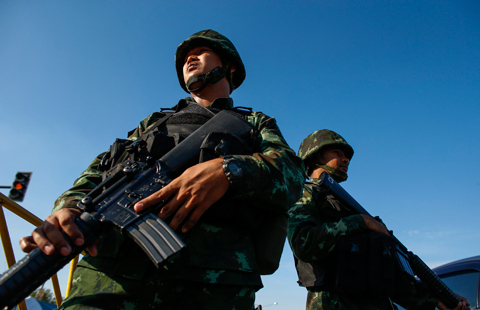Russia halts gas to Ukraine as dispute over unpaid bills keeps raging on
(Xinhua) Updated: 2014-06-17 09:11
 |
Gazprom, Russia's energy giant, announced its decision to introduce prepayment regime with Ukraine's Naftogaz company Monday, as the latter failed to pay its multi-billion-US dollar gas bills.
"The decision was made because of the chronic nonpayment by Ukraine's Naftogaz. Arrears by the company for Russian gas deliveries stand at 4.458 billion dollars," Gazprom said in a statement, adding 1.451 billion dollars were owed for deliveries between November and December, 2013, and 3.007 billion dollars for April-May this year.
The decision took effect at 10:00 am Moscow time (0600 GMT), several hours after representatives of Russia, Ukraine and the European Commission concluded fruitless overnight talks over the dispute.
Gazprom said it had filed a lawsuit at the Stockholm arbitration court demanding Ukraine pay off the gas debt. Naftogaz, in turn, said it also brought a litigation at the same court to contest the pricing of natural gas it imports from Gazprom.
The Ukrainian company said it was also seeking to recover around 6 billion dollars from Gazprom, which were "overpaid" due to the "unfair" gas contract since 2010.
In the meantime, Russian Prime Minister Dmitry Medvedev accused part of the Ukrainian leadership of "losing adequacy," citing interim Ukrainian Prime Minister Arseny Yatsenyuk's refusal to a preferential gas price and the "paranoid behavior" of the country' s acting foreign minister Andrei Deshchytsa over the weekend for hurling insulting remarks on Russian President Vladimir Putin.
The European Commission had attempted to broker a constructive deal over the gas row, but failed to do so probably due to "a factor of other countries that influence the development of this situation," Medvedev told a meeting attended by participants including Energy Minister Alexander Novak and Gazprom CEO Alexei Miller, according to reports run by the Interfax news agency.
Miller, who appeared to be more furious, called Kiev's position as "blackmail," adding the "artificial gas crisis ... will in the end harm the Ukrainian economy."
Medvedev also said Russia should not close off all opportunities for a dialogue.
"If our colleagues in Ukraine start to hear (our) reasoning better (and) return to a discussion of ... highly concessional and very preferential offers made by Russia, I think we will be ready to continue talks," he said. "But of course, under the condition that debt is settled in full."
Gazprom promised it will supply gas to consumers in other parts of Europe in full volume, but warned the European Commission of potential interruption in gas transit through Ukraine. It also urged the Ukrainian side to abide by the obligations and ensure a smooth gas transit.
As Russia-Ukraine gas row continues to roil over the payment of bills, other European countries may receive more gas from the currently restricted OPAL pipeline, a 470-kilometer-long infrastructure that is one of two projected pipelines connecting the Nord Stream pipeline to the existing pipeline grid in Middle and Western Europe.
"If we see problems with transporting through the territory of Ukraine, then the issue of OPAL will be brought up and resolved," Miller told a press conference.
The European Third Energy Package mainly prohibits the gas producer to be the owner of gas pipelines. In accordance with the regulation, Gazprom is currently allowed to use only half of the OPAL pipeline's capacity of 36 billion cubic meters a year.
Russia has proposed to put OPAL's spare capacity on auction, but was rejected at the last minute in March when tension surrounding Ukraine was rising.










